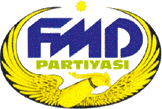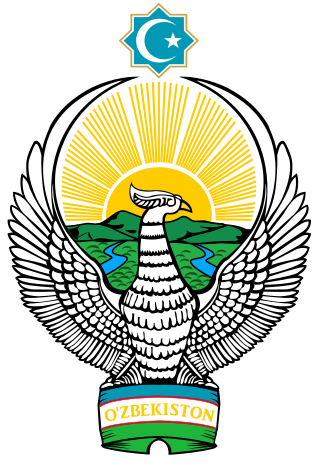
The Republic of Uzbekistan is a semi-presidential constitutional republic, whereby the President of Uzbekistan is head of state. Executive power is exercised by the government and by the Prime Minister of Uzbekistan.

Sodiq Solihovich Safoyev, also known as Sodyq Safayev is first deputy chairperson of the Senate of Uzbekistan's Parliament, former Minister of Foreign Affairs of Uzbekistan from 14 March 2003 until 4 February 2005.

The Uzbekistan Liberal Democratic Party, officially the Movement of Entrepreneurs and Businessmen – Liberal-Democratic Party of Uzbekistan, is a political party in Uzbekistan and the country's ruling party. The four other parties in the Oliy Majlis, Uzbekistan's parliament, are pro-government.

The Self-Sacrifice National Democratic Party was a political party in Uzbekistan.

The Uzbekistan "National Revival" Democratic Party, often known as simply Milliy Tiklanish, is a national-conservative political party in Uzbekistan. It is allied with the Liberal Democratic Party of Uzbekistan, the country's ruling party.

The Oliy Majlis is the parliament of Uzbekistan. It succeeded the Supreme Council of the Republic of Uzbekistan in 1995, and was unicameral until a reform implemented in January 2005 created a second chamber.

The Legislative Chamber is the lower chamber of the Oliy Majlis of the Republic of Uzbekistan. It has 150 members, 135 elected for a five-year term in single-seat constituencies using the two-round system and previously until the new president came to power, 15 seats were taken by the Ecological Movement of Uzbekistan. Today, the Ecological Movement of Uzbekistan is a full participant, and participates in parliamentary elections as an "Ecological party of Uzbekistan". Elections of deputies to the Legislative Chamber are universal. Citizens of the Republic of Uzbekistan who have reached the age of eighteen by the election day have the right to vote. The citizens who have reached the age of twenty-five by the date of election and have been residing in the Republic of Uzbekistan for at least five years have the right to be elected to the Legislative Chamber. Citizens who are recognized to be incapacitated by the court, as well as persons held in places of detention by a court sentence, cannot be elected and participate in elections.

The president of the Republic of Uzbekistan is the head of state and executive authority in Uzbekistan. The office of President was established in 1991, replacing the position of Chairperson of the Presidium of the Supreme Soviet of the Uzbek SSR, which had existed since 1925. The president is directly elected for a term of seven years, by citizens of Uzbekistan who have reached 18 years of age.

The Constitution of Uzbekistan was adopted on 8 December 1992 on the 11th session of the Supreme Council of Uzbekistan. It replaced the Constitution of the Republic of Uzbekistan of 1978. It is the supreme law of the Republic of Uzbekistan. The Constitution of Uzbekistan contains six parts and it is further divided into 26 chapters.

Parliamentary elections were held in Uzbekistan on 27 December 2009 and 10 January 2010 to elect the 150 members of the Legislative Chamber of Uzbekistan, the lower house of the Oliy Majlis. Of these, 135 were directly elected from single member constituencies using the two-round system, while 15 seats were reserved for the country's Ecological Movement. Provincial and district councils were elected at the same time. Polls opened at 06:00 and closed at 20:00.

The Ecological Party of Uzbekistan is a political party and environmental movement in Uzbekistan. It was founded on 2 August 2008 as the Ecological Movement of Uzbekistan, and re-inaugurated as a formal political party in January 2019 in advance of expected electoral reforms.

Parliamentary elections were held in Uzbekistan on 21 December 2014, with a second round on 4 January 2015, alongside provincial and district council elections. The Uzbekistan Liberal Democratic Party remained the largest party, winning 52 of the 135 elected seats in the Legislative Chamber.

The Supreme Soviet of the Uzbek SSR was the supreme soviet of the Uzbek SSR from 1938 to 1991. The Supreme Soviet of the Uzbek SSR was preceded by the All-Uzbek Congress of Soviets which operated from 1925 to 1938. After the independence of Uzbekistan in 1991, the Supreme Soviet of the Uzbek SSR was briefly succeeded by the Supreme Council of the Republic of Uzbekistan from 1991 to 1994.
Hotamjon Abdurahmonovich Ketmonov is an Uzbek politician who served as member of the Legislative Chamber from 2015 to 2019, and the chairman of the People's Democratic Party of Uzbekistan from 2013 to 2019, and candidate in the 2015 and 2016 Uzbek presidential election.

Presidential elections were held in Uzbekistan on 24 October 2021. This was the sixth presidential election held since independence. Incumbent President Shavkat Mirziyoyev won a second term with a majority 80.1% of the vote, although faring the lowest performance for an incumbent in terms of vote share since 1991. Maqsuda Vorisova from the People's Democratic Party of Uzbekistan (XDP) was the runner-up and Alisher Qodirov from the Uzbekistan National Revival Democratic Party came third, which marked the first time that more than two candidates had officially received more than 5% of the vote.

Rahim Rasuljonovich Hakimov — Uzbek legal scholar, politician, Deputy of the Legislative chamber of Oliy Majlis of the Republic of Uzbekistan (2015-2019). By the decree of the President of the Republic of Uzbekistan dated September 19, 2019, he was appointed as a Deputy Minister of justice of the Republic of Uzbekistan – rector of Tashkent State University of Law. According to Presidential Decree No. PP-5156 of June 21, 2021, he was appointed as a Deputy Minister of Higher and Secondary Specialized Education of the Republic of Uzbekistan on Science and Innovation and he is a first class Justice Advisor.
Behzod Sodiqovich Yo‘ldoshev was an Uzbek physicist, a science organizer, and a public figure. He served as the president of the Academy of Sciences of the Republic of Uzbekistan from 2000 to 2005 and again from 2017 onwards. He was an academician of the Academy of Sciences of Uzbekistan (2000) and held a Doctor of Physical and Mathematical Sciences degree. Yoʻldoshev died on 28 August 2024, at the age of 79.
Svetlana Baymirzaevna Artikova( was born on January 1, 1962, in Uchkurgan District, Namangan Region) is a lawyer, public and political figure, senator, and Deputy Chairman of the Senate. Since November 7, 2019, she has been appointed Deputy Prosecutor General of the Republic of Uzbekistan.
Umidakhon Ahmadjanova Zakirova is an Uzbek teacher, poet and politician. Since 2020, Zakirova is deputy of the Legislative Chamber from Andijan constituency No. 9. She is a member of the Uzbekistan Liberal Democratic Party.











